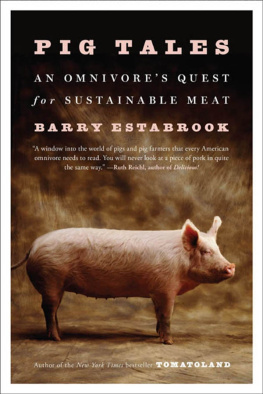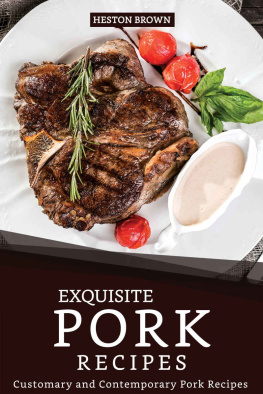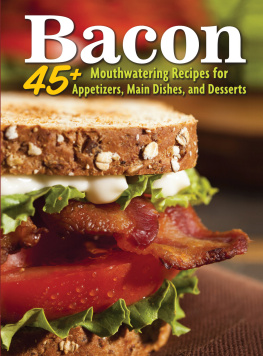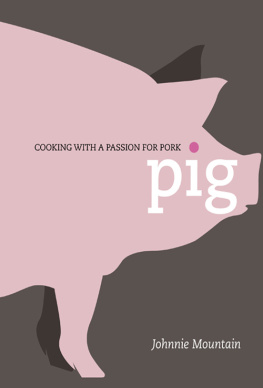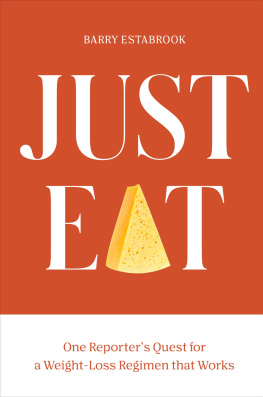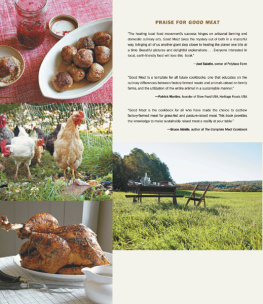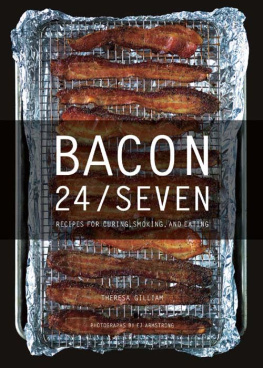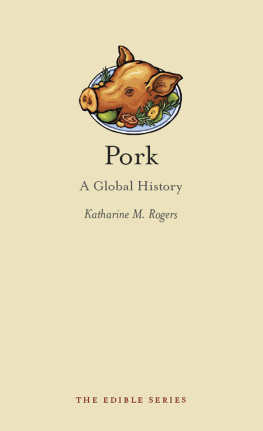Estabrook - Pig tales: an omnivores quest for sustainable meat
Here you can read online Estabrook - Pig tales: an omnivores quest for sustainable meat full text of the book (entire story) in english for free. Download pdf and epub, get meaning, cover and reviews about this ebook. City: New York, year: 2015, publisher: W. W. Norton & Company, genre: Detective and thriller. Description of the work, (preface) as well as reviews are available. Best literature library LitArk.com created for fans of good reading and offers a wide selection of genres:
Romance novel
Science fiction
Adventure
Detective
Science
History
Home and family
Prose
Art
Politics
Computer
Non-fiction
Religion
Business
Children
Humor
Choose a favorite category and find really read worthwhile books. Enjoy immersion in the world of imagination, feel the emotions of the characters or learn something new for yourself, make an fascinating discovery.
- Book:Pig tales: an omnivores quest for sustainable meat
- Author:
- Publisher:W. W. Norton & Company
- Genre:
- Year:2015
- City:New York
- Rating:3 / 5
- Favourites:Add to favourites
- Your mark:
- 60
- 1
- 2
- 3
- 4
- 5
Pig tales: an omnivores quest for sustainable meat: summary, description and annotation
We offer to read an annotation, description, summary or preface (depends on what the author of the book "Pig tales: an omnivores quest for sustainable meat" wrote himself). If you haven't found the necessary information about the book — write in the comments, we will try to find it.
Estabrook: author's other books
Who wrote Pig tales: an omnivores quest for sustainable meat? Find out the surname, the name of the author of the book and a list of all author's works by series.
Pig tales: an omnivores quest for sustainable meat — read online for free the complete book (whole text) full work
Below is the text of the book, divided by pages. System saving the place of the last page read, allows you to conveniently read the book "Pig tales: an omnivores quest for sustainable meat" online for free, without having to search again every time where you left off. Put a bookmark, and you can go to the page where you finished reading at any time.
Font size:
Interval:
Bookmark:
PIG TALES
An
OMNIVORES QUEST
for
SUSTAINABLE MEAT
BARRY ESTABROOK

W. W. NORTON & COMPANY
New York London

FOR RUX
CONTENTS
Pigs grunt in a wet wallow-bath, and smile as they snort and dream. They dream of the acorned swill of the world, the rooting for pig-fruit, the bagpipe dugs of the mother sow, the squeal and snuffle of yesses of the women pigs in rut. They mud-bask and snout in the pig-loving sun; their tails curl; they rollick and slobber and snore to deep, smug, after-swill sleep.
DYLAN THOMAS, Under Milk Wood
PIG TALES
SOME PIG
A PORK CHOP nearly got me thrown in jail.
I was in the second row of the spectators gallery at a trial in Winchester, Illinois, a county seat of 1,700 citizens. Ten residents of flat, cornfield-studded, and profoundly rural Scott County had filed a nuisance suit against the owners of a massive hog farm that kept 15,000 animals crammed into a few low, warehouse-like buildings near their homes creating foul smells and infestations of flies, the plaintiffs claimed. More than seventy townsfolk had packed into Winchesters redbrick Victorian courthouse, a grand structure that must have been built in anticipation of a prosperous future that never materialized. I had no trouble seeing where their loyalties lay. Virtually everyone sat on the plaintiffs side, leaving empty rows of seats behind the tables of the defendants lawyers. From the outset, Judge David Cherry of the Seventh Circuit Court of Illinois, a beefy middle-aged fellow, seemed nervous and a little out of sorts. In his opening remarks to jurors, he said that getting them selected in such a close-knit community had been the longest ordeal hed ever been part of.
When he returned to the courtroom after the lunch recess, Judge Cherry was red-faced and made no attempt to hide his anger. There has been a serious breach in security, he said, and ordered Karen Hudson, who had come to watch the proceedings, to approach the bench. Hudson is a veteran campaigner against factory farms and the head of an organization called Illinois Citizens for Clean Air and Water. In a brown pantsuit and with her unnaturally blond hair sprayed neatly in place, she looked more like a Sunday-school teacher than a zealous environmental crusader. Judge Cherry held up a pamphlet put out by her group and a paperback copy of The CAFO Reader: The Tragedy of Industrial Animal Factoriesan anthology of articles condemning modern confinement farms such as the one owned by the defendants. The judge informed Hudson that bringing such literature into his courtroom and sharing it could be construed as jury tampering. She stammered an apology, but that only made Judge Cherry angrier. He had the sheriff arrest her immediately. The officer clapped handcuffs on the middle-aged woman and escorted her out of court. The judge then adjourned the trial and told the legal teams to meet with him in his chambers. On the way out, he said to me, You wait here.
A half hour later, he summoned me to his office, which was crowded with ten lawyers representing both sides in the case. He gestured to a copy of a book I had written about industrial tomato agriculture and asked if I had brought it to court. I explained that one of the plaintiffs attorneys had requested a couple of copies and that I had waited until the noon recess to give them to the lawyer, who placed them facedown on the table. After several more questions, Judge Cherry said that he was tempted to give me the same treatment he had given Hudson, but because my misdeeds did not rise to the level of hers, he was simply going to have me removed from his courtroom.
The trial had been open to the media, and I had sat silently taking notes during the mornings session. I got an inkling of what may have been behind Judge Cherrys decision when I learned that a member of the hog farmers legal team had seen me hand over the books and reported the incident to the judge. Ultimately, Judge Cherry declared a mistrial on the chance that the jurors could have been influenced if they had seen Hudsons book and pamphlets.
Based on the opening statements I had heard, I could imagine plenty of reasons why the lawyers for the pork producers wouldnt want a journalist in the courtroom. During my three hours there, I had heard how a company run by one of the defendants had bought a small farm and, without informing any of the neighbors, erected four buildings and filled them with those 15,000 hogs. The plaintiffs lawyer said that the new pig factory emitted noxious odors through fans that blew dust, dander, and more than 200 gaseous chemical compounds over nearby homes. Manure, allowed to collect in vast pits under the barns and applied to fields without any treatment in quantities that made the ground too wet to plow, created a stench so bad that the neighbors, many from families who had lived on the same land for several generations, had to keep their windows closed in the summer. Within two months of the facilitys opening, investigators from the Environmental Protection Agency (EPA) found that dead hogs had been left lying around the barns to rot, creating more stink and attracting hordes of flies that pestered area residents. The three Hispanic employees who tended the pigs spoke no English and could not read state manuals on how to legally dispose of the pigs that died in their care, which the plaintiffs lawyer said could amount to one hundred a week. State and federal officials had refused to act, forcing the reluctant plaintiffs to sue.
The defense attorney countered that, this being rural Illinois, manure odors, flies, and dead livestock were simply facts of farming life, the nature of the business. Besides, the facility now sent animals that died to a rendering plant, a legal method of disposal. Those dust-spewing ventilators kept the pigs cool and healthy. Everything his clients did, including spraying manure on the land, complied with state regulations. The confinement buildings that housed the hogs were an example of innovation in the industry, and he would introduce expert witnesses who would testify that the farm attracting the neighbors ire was a well-run, thoroughly modern operation. These facilities are lawfully there, he said.
Both lawyers were right. The pig factory with its thousands of crammed-together animals did pollute the air. Animals did sicken and die by the hundreds. Neighbors could no longer enjoy their homes and yards. But it was all perfectly lawful. That pig factory was no different from thousands of other operations across the country that produce virtually all the pork eaten in the United States today.
The chop that got me thinking about the way we raise pigs in this country came from a hog raised at Flying Pigs Farm, an idyllic stretch of pastures and forest set amid the hills of upstate New York. The pigs, hearty heritage breeds that dont fit the cookie-cutter demands of factory pork production, roam freely, and produce the finest meat Ive ever tasted. My chop was transcendent, red in color, and well marbled with strands of delicious fat that made it tender, juicy, and sublimely porky. It bore no resemblance to the bland other white meat sold in supermarkets. It was as different as a hard, pinkish January tomato is from an heirloom pulled off the vine in a garden on a warm summer afternoon. I wanted to find out how mass-produced pork met with such a fate and learn everything I could about modern hog production. When I told my partner of my plans, she sighed, Does this mean Ill have to give up eating bacon? This book is my answer to that question.
Next pageFont size:
Interval:
Bookmark:
Similar books «Pig tales: an omnivores quest for sustainable meat»
Look at similar books to Pig tales: an omnivores quest for sustainable meat. We have selected literature similar in name and meaning in the hope of providing readers with more options to find new, interesting, not yet read works.
Discussion, reviews of the book Pig tales: an omnivores quest for sustainable meat and just readers' own opinions. Leave your comments, write what you think about the work, its meaning or the main characters. Specify what exactly you liked and what you didn't like, and why you think so.

